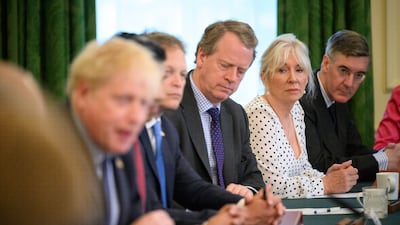The British are good at satire, probably because historically they have had plenty to be scathingly funny about. The 18th century was a golden age for this most bitter style of wit. The poetry of Alexander Pope or Gulliver’s Travels and other works by Jonathan Swift are in a humorous tradition that goes back at least to Roman times. Pope’s humour was gentle; Swift’s brutal. Swift once suggested (satirically) that the cure for Irish poverty was to eat babies. Nasty humour goes with very tough times.
In our more recent tough times, Britain in the 1960s and '70s, satire again bloomed. The UK was a once great nation, which famously had “lost an empire and failed to find a role”, and was seen as “the Sick Man of Europe". BBC TV invented the political satire That Was The Week That Was. The fortnightly satirical magazine Private Eye was founded in 1961 and mixed factual news with cartoons and amusing stories to deflate the pomposity of those in power. Nowadays Private Eye is experiencing a new boom. While daily newspapers have lost readers as people work from home, Private Eye’s circulation figures (June 2022) have bucked the trend, recently reaching almost 250,000 copies.
It’s easy to see why. British politics is filled with personalities who are easy to satirise. Some politicians almost satirise themselves. Making fun of those in power is a British tonic in increasingly hard times. With inflation skyrocketing, a cost-of-living crisis, war in Ukraine and the endless Brexit botch-up, we all need cheering up.
The former editor of Private Eye in the 1970s, Richard Ingrams, reputedly said that the prospect of Britain electing an incompetent prime minister appalled him as a British citizen, but as editor of a satirical magazine, he was quite encouraged.
Ingrams's successor, today, Ian Hislop, may also be horrified as a British citizen by the cast of oddball characters in British public life, but our political eccentrics are certainly good for his magazine business. There is the current (at least for the next few days) Prime Minister Boris Johnson, of course – a character possibly now beyond satire.
Then there are Mr Johnson’s putative successors, Rishi Sunak and Liz Truss, who are much loved by cartoonists and comedians. The next level of satirical targets, includes Culture Secretary Nadine Dorries, Home Secretary Priti Patel, Transport Secretary Grant Shapps, Jacob Rees-Mogg and many others. Their antics are so peculiar that if British people did not laugh, they would weep.
For example, Mr Rees-Mogg is both an MP and something called the “Brexit Opportunities Minister”. He is so bizarrely old-fashioned he is sometimes called the “Honourable Member for the 18th century”. Lacking any real ideas about Brexit “opportunities”, Mr Rees-Mogg appealed to readers of a tabloid newspaper, The Sun, asking if they have discovered “any petty old EU regulation that should be abolished”. Transport Secretary Mr Shapps suggested that bicycles should be forced to have number plates like cars, a suggestion so ludicrous it was immediately repudiated by the grown-ups in his own government department. He also said he would crack down on pointless announcements on trains – hardly the top priority of the British people. Culture Secretary Ms Dorries runs a department which covers sport, television, and theatre, a department sometimes called the “Ministry of Fun”. Her gaffes are too numerous to mention, but they include the idea that tennis is played on “tennis pitches”, and that people “downstream” movies.
Other recent government ministers have been mocked for offering a ferry contract to a company without ferries, and, in the case of an agriculture minister, masterminding a campaign against badgers spreading disease in cattle but conceding it had failed because the badgers “moved the goalposts”. A government “outwitted by badgers” is truly beyond satire.
Whether these real-life English political eccentrics make life easier for comedy writers or more difficult is, however, open to debate. Some satirists, including the film director Armando Iannucci, accept that it’s problematic competing with the activities of real politicians. And that brings us to our (almost certainly) new prime minister, the eminently satirise-able Liz Truss.
If she is confirmed as prime minister next month then, like the satire boom of the 1970s, Ms Truss will lead the UK at a time of extraordinary difficulty, when many voters are disillusioned with politics entirely. According to a February 2021 Commons Library Research Paper Political Disengagement in the UK: “The proportion of people who trusted the government to put the needs of the nation first decreased from 38 per cent in 1986 to 17 per cent in 2013. Trust in politicians has been fluctuating around 9 per cent.”
I am among the 91 per cent of distrustful British citizens. I don’t find the incompetence of the political elite amusing. Being prime minister should not be a comedy act. But I am also a faithful reader of satirical magazines. And British satire is nowadays of Olympic gold medal standard. Unfortunately good governance, for the foreseeable future, is not.


